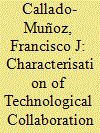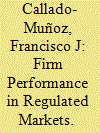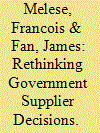|
|
|
Sort Order |
|
|
|
Items / Page
|
|
|
|
|
|
|
| Srl | Item |
| 1 |
ID:
184056


|
|
|
|
|
| Summary/Abstract |
Collaboration with technological partners as an innovation strategy has become widespread in recent years, and all sectors are immersed in this process. In particular, the defence industry is characterised by the technological complexity of the products and services offered, together with a constant innovation process. However, data that allow us to identify characteristics that are found in collaboration contracts are not usually available in this sector. This paper addresses this gap in the literature by studying the different characteristics of both the technological partners and the development agreements for the 1999-2017 period. This is possible thanks to a database of more than 300 collaboration technology agreements between public and private organisations and the Spanish Ministry of Defence. The results provide the Ministry of Defence with a clear picture of the type of collaborations in the Defence industry, their partners and their behaviour under different economic conditions, which will help it identify the type of collaborations that can contribute to improving the design of its innovation strategy.
|
|
|
|
|
|
|
|
|
|
|
|
|
|
|
|
| 2 |
ID:
184051


|
|
|
|
|
| Summary/Abstract |
This study estimates the joint effect of a new political regime and war against Iraq, on Iran’s per capita Gross Domestic Product (‘GDP,’ constant 2010 US$) for the period 1978–1988, during the revolution/war. I use a synthetic control approach, whereby a synthetic Iran is constructed as a weighted average of other Middle East and North Africa (‘MENA’)/Organization of the Petroleum Exporting (‘OPEC’) countries to match the average level of some key per capita GDP correlates over the period 1970–1977 as well as the evolution of the actual Iranian per capita GDP during that period. I find a sizable negative effect of the joint treatment. The average Iranian lost an accumulated sum of approximately US$ 34,660 during 1978–1988 (i.e. the average annual real per capita income loss of US$ 3,150). This loss equals 40% of the real income per capita, which an Iranian could earn in the absence of revolution and war. The confidence sets based on constant, linear, and uniform assumptions of treatment effect show that estimated income loss for Iran is sizeable and statistically significant. The results remain robust to a set of placebo tests.
|
|
|
|
|
|
|
|
|
|
|
|
|
|
|
|
| 3 |
ID:
184055


|
|
|
|
|
| Summary/Abstract |
This paper studies the effects of legal reforms associated with defence and public procurement on firm performance. With this aim, a theoretical framework for the reaction of defence firms to regulatory changes is developed. Its predictions have been empirically assessed using the last reforms implemented in Spain. Our results suggest that these new regulations have allowed the main defence contractors to outperform the other defence contractors in terms of productivity, having no effect on profitability. These findings are in line with theoretical priors. Therefore, it can be claimed that governmental interventions have had an effect on firm performance. We also provide evidence that, while the procurement procedures and the contract law put into place in 2011 have principally affected the productivity of large firms, the centralization process established in 2014 has exerted a higher influence on SMEs.
|
|
|
|
|
|
|
|
|
|
|
|
|
|
|
|
| 4 |
ID:
184052


|
|
|
|
|
| Summary/Abstract |
Are price discontinuities in cryptocurrencies jointly related to large swings in geopolitical risk? This is a relevant question to answer given recent news from the press that Bitcoin’s price jumps are driven by jumps in the level of geopolitical risk index. To answer this question, we examine first the jump incidence of daily returns for Bitcoin and other leading cryptocurrencies and then study the co-jumps between cryptocurrencies and the geopolitical risk index using logistic regressions. Our dataset is at the daily frequency and covers the period 30 April 2013 to 31 October 2019. The results show that the price behaviour of all cryptocurrencies under study is jumpy but only Bitcoin jumps are dependent on jumps in the geopolitical risk index. This revealed evidence of significant co-jumps for the case of Bitcoin only nicely complements previous studies arguing that Bitcoin is a hedge against geopolitical risk.
|
|
|
|
|
|
|
|
|
|
|
|
|
|
|
|
| 5 |
ID:
184053


|
|
|
|
|
| Summary/Abstract |
Net profits of state-run chance games are either earmarked for non-defence ‘good causes’ or added to the public purse in international practice. The Turkish case is unique as 95% of profits were earmarked for the extrabudgetary Defence Industry Support Fund (DISF) by legislation during 1986–2007. The DISF administers security equipment procurement and domestic arms production in Turkey. The earmarking practice was dissolved in 2007 and chance game profits are transferred to the general budget. The incomings of the DISF are from the budget and from earmarked taxes from 2007 onwards. The purpose of this paper is to investigate the effect of these practices on chance game sales for the period 1986–2017. Noting that a chance game is a joint public-private good, participation is motivated by expectations for private gain but at the same time loss is legitimised by expectations for provision of public services with the takeout part. In order to gain insight into the societal motives in chance game participation in Turkey our model is defined in the context of private (consumerism) cum public (security, warfare) interest. The VECM estimates support a long-run relationship between chance game sales and security variables.
|
|
|
|
|
|
|
|
|
|
|
|
|
|
|
|
| 6 |
ID:
184057


|
|
|
|
|
| Summary/Abstract |
This paper offers an economic model to assist public procurement officials to rank competing vendors when benefits cannot be monetized. An important defense application is ‘source selection’ – choosing the most cost-effective vendor to supply military equipment, facilities, services or supplies. The problem of ranking public investment alternatives when benefits cannot be monetized has spawned an extensive literature that underpins widely applied decision tools. The bulk of the literature, and most government-mandated decision tools, focus on the demand side of a public procurement. The ‘Economic Evaluation of Alternatives’ (EEoA) extends the analysis to the supply side. A unique feature of EEoA is to model vendor decisions in response to government funding projections. Given a parsimonious set of continuously differentiable evaluation criteria, EEoA provides a new tool to rank vendors. In other cases, it offers a valuable consistency check to guide government supplier decisions.
|
|
|
|
|
|
|
|
|
|
|
|
|
|
|
|
| 7 |
ID:
184054


|
|
|
|
|
| Summary/Abstract |
This study examines whether governments use the revenues accruing from agricultural taxes to finance their arms imports. This policy issue is especially of importance for developing countries as the decision to finance the acquisition of arms using agricultural taxes will create a trade-off between two important policy objectives in these countries: on the one hand, ensuring food security for the population at large and, on the other hand, improving national security. Our empirical findings generally suggest that governments in developing countries partly finance their arms imports by increasing the agricultural tax rate. It turns out that the magnitude of this effect relies to a certain extent on country-specific factors such as whether a country has to deal with a security threat, strength of the democratic institutions in place, and the regular occurrence of major shocks to the domestic food provision. Also, taxes on cash crops intended for export are more likely to be used for financing the arms imports compared to taxes on import-competing or subsistence crops.
|
|
|
|
|
|
|
|
|
|
|
|
|
|
|
|
|
|
|
|
|